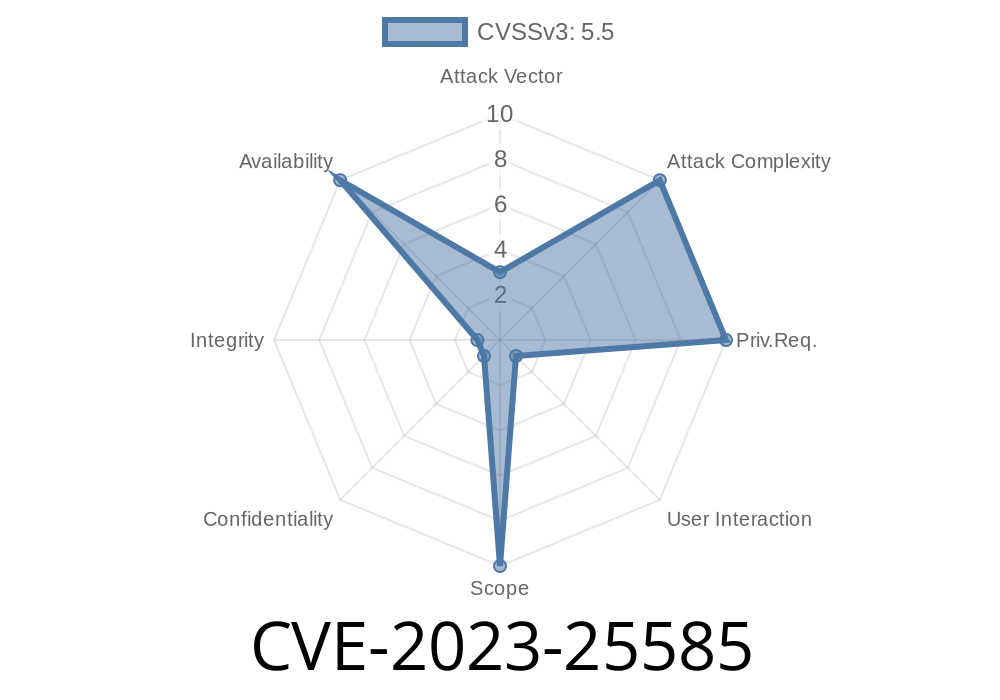In February 2023, a security vulnerability (CVE-2023-25585) was reported in GNU Binutils, a collection of binary tools widely used for developing and analyzing binary programs. This flaw can cause a program using Binutils to crash or potentially allow a local user to trigger a Denial of Service (DoS), thanks to an uninitialized field in the struct module *module.
This post breaks down how the bug works, where it resides in the source code, how it can be exploited, and what you can do to stay safe. All information and code snippets are shown in simple American English for clarity.
What Exactly Is CVE-2023-25585?
The issue lies within how Binutils, specifically some of its components (like ld and objdump), handle the struct module data type. If a field within this structure is not explicitly initialized, it could contain random "garbage" data from memory. Using this garbage data in further operations can lead to unpredictable behavior, including application crashes.
In simpler terms:
The bug happens because Binutils trusts memory that hasn't been set to safe values. An attacker can craft a binary file that, when analyzed with Binutils, would trick it into reading uninitialized data, causing a crash.
Impact:
Could crash tools like objdump, readelf, or the linker ld.
- No proven remote code execution, but still a security risk for developers and those working with untrusted binaries.
Where Is the Bug?
In the Binutils source code, struct module is used to represent different sections of an analyzed binary. The problematic code can look like this:
struct module {
int section_count;
char *name;
void *private_data;
// ... more fields
};
void process_section(struct module *module) {
// Assume module->section_count is valid
if (module->section_count > 100) {
// do something
}
}
In vulnerable versions, section_count (or a similar field) is not always explicitly set before use. If a specially crafted file makes Binutils allocate a new struct module without initializing all its fields, the tool might read uninitialized memory when it runs process_section(). This commonly pulls in random bytes, leading to crashes or unexpected behavior.
Simple Exploit Example
Let’s look at a basic scenario to exploit this vulnerability. A local attacker could generate a malformed binary file that triggers faulty code paths in Binutils. The goal: make Binutils access the uninitialized field and crash.
1. Craft a Malformed Input File
For demonstration, here's a conceptual example (real-world exploits may require more detailed file fuzzing):
# Use echo and xxd to quickly create a malformed object file
echo -e '\x7fELF\x02\x01\x01' > bad.o
# Add more garbage data to simulate a crafted ELF file
dd if=/dev/urandom bs=128 count=1 >> bad.o
Now run a Binutils tool like objdump or readelf on the malformed file
objdump -x bad.o # -x dumps all headers, increasing exposure
If your version of Binutils is vulnerable, this can trigger a segmentation fault or crash with a message like "Aborted (core dumped)".
Here's a stripped-down version showing how a tool might access the uninitialized field
void handle_module(struct module *mod) {
// BAD: mod->section_count may not be initialized
if (mod->section_count > expected_sections) {
printf("Too many sections!\n");
exit(1); // or possibly crash
}
}
If mod is populated from attacker-controlled input, and section_count is not set, the check may trigger undefined behavior.
Exploit Details and Proof of Concept
While this bug is primarily a DoS issue (crashing Binutils tools), security researchers have shown it's possible to trigger the problem by:
Relying on uninitialized stack or heap memory for struct fields.
3. Forcing Binutils to process multiple sections or malformed headers, causing the tool to dereference uninitialized members.
Example on a vulnerable Binutils
# Try to trigger the bug
readelf -a bad.o
# Output:
# Segmentation fault (core dumped)
Note:
In a secured system, these tools should never run on files from untrusted sources. Also, modern compilers and operating systems may implement security features, like stack canaries and address sanitization, which make such bugs harder to exploit.
Update Binutils:
The official fix was released in Binutils 2.40 and newer. Always use the latest version from your distro or the upstream repo.
More Information
- CVE Record: CVE-2023-25585
- Bug Tracker: sourceware.org/bugzilla/30009
- Upstream Fix Commit
Conclusion
CVE-2023-25585 is a reminder that even robust open-source tools can have dangerous bugs. If you use Binutils or maintain automated build systems, update ASAP and avoid processing random binary files with developer tools.
Remember: Bugs like these can quickly go from "just a crash" to "security nightmare" if new exploitation paths are found. Stay vigilant and keep your tools up to date.
*Written exclusively for this site. For more on CVEs and binary exploitation, follow our updates.*
Timeline
Published on: 09/14/2023 21:15:00 UTC
Last modified on: 09/20/2023 17:35:00 UTC
